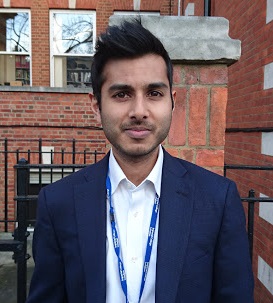Research into fungal diseases, a condition that affects many CF patients, has been granted funding  through the Vertex Cystic Fibrosis (CF) Research Innovation award.
through the Vertex Cystic Fibrosis (CF) Research Innovation award.
The award aims to inspire and support clinical researchers who are working to advance the understanding of CF, and was awarded to Dr Anand Shah (pictured), a respiratory consultant at the Trust who specialises in adult CF.
Impressively Dr Shah was one of only 4 recipients worldwide to be awarded the funding.
The award will be used to research pulmonary fungal disease caused by a fungus, known as Aspergillus fumigatus, in patients with CF.
The disease contributes to a decline in lung function and an increased risk of mortality after lung transplantation, making it an important area for research.
In healthy patients a particular type of cell, known as the alveolar macrophage, is involved in fighting the fungal infection. However, in individuals with CF, these cells are impaired, leading to a spread of the infection in the lungs.
Current research into what happens at a molecular level in the lungs in CF following exposure to Aspergillus fumigatus has not been well documented and is often limited to animal models, which may not translate to humans.
With his award, Dr Shah aims to use alveolar macrophage models from human stem cells to analyse how they respond to Aspergillus fumigatus in healthy human cells compared with CF cells.
Dr Shah hopes that by identifying these mechanisms, potential targets for the development of new treatments can be developed.
“The funding provided through this award is an exciting opportunity to research a relatively poorly understood but increasingly important area of infection within individuals with CF.
“With increasing antimicrobial resistance, it is vital to have a better insight into the abnormal human immune response to fungal pathogens seen in diseases like CF and identify novel therapeutic targets.” Dr Shah said.
If you would like to find out more about this research, or any of our other research, please contact us.
